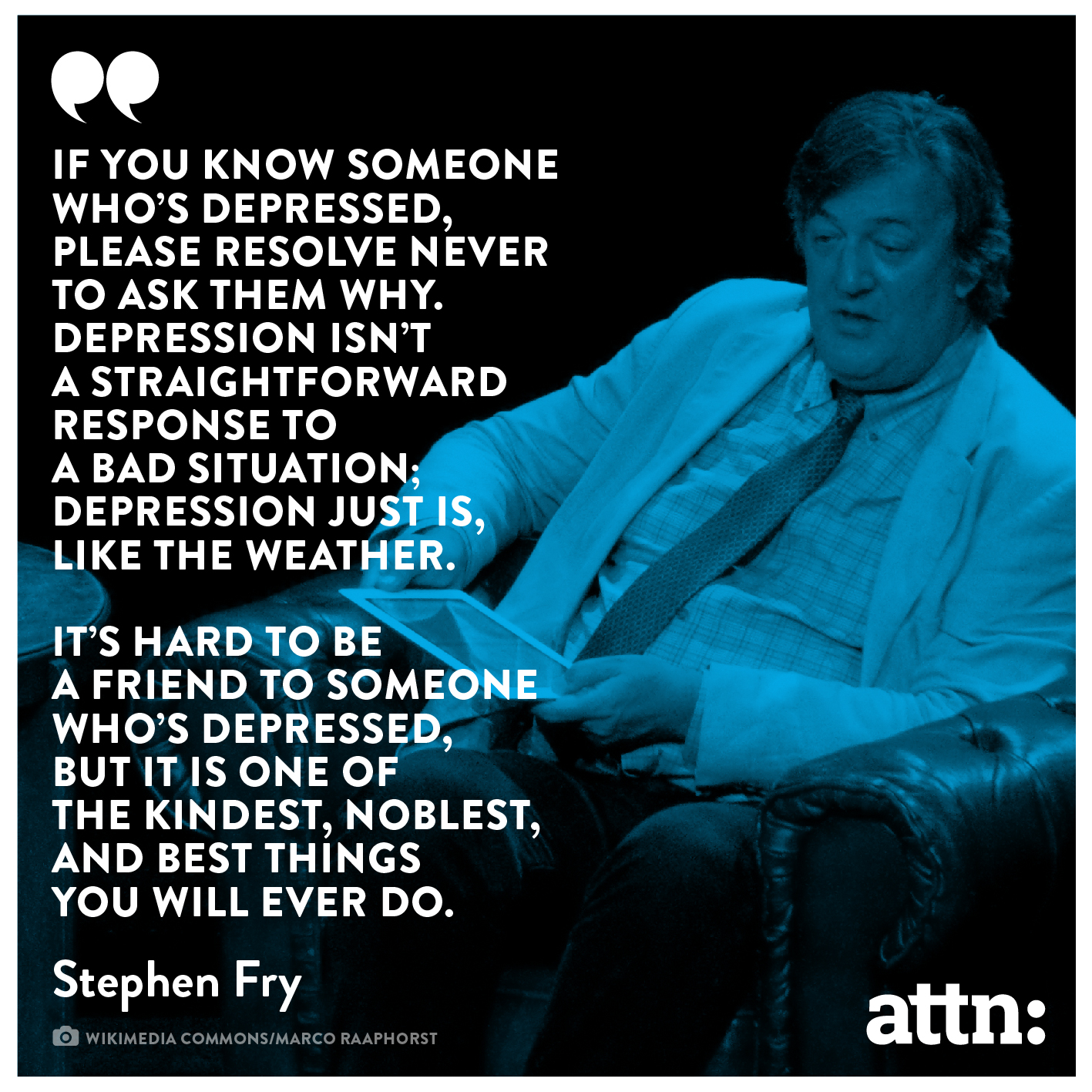Sarah Silverman Just Perfectly Described What Depression Feels Like

By:
Comedian Sarah Silverman portrays a woman suffering from depression in upcoming film "I Smile Back," and having suffered from the mental health issue herself for many years, she understands the pain of it all too well.
RELATED: This Comic Perfectly Explains Why Anxiety and Depression Are so Difficult to Fight
Speaking to "Fresh Air's" Terry Gross, Silverman revealed that she was 14 when she started taking medication for depression.
"I can only speak from my own experience, and I would say that the depression I experienced feels like a chemical change," she said. "When it came over me, when it comes over me, it feels like it's coming over me like a flu. You ever just sit ... and you're fine and the next moment you just go, 'Oh, Jesus, I have the flu.'"
As ATTN: has noted before, nearly 20 percent of America's adult population suffers from mental illness, yet many don't understand how it works and sometimes argue that those who suffer can merely "snap out of it" by changing their attitude. But those who live with mental illness can't just talk themselves out of it, much like people with physical illness don't heal by merely altering their mindset. That's why Silverman's description of her depression as a "chemical change" is so important.
Silverman also revealed that she started feeling depressed at age 13, despite having had mostly positive experiences in school.
"I had been an extremely social person with best friends and the class clown and all of that meant nothing suddenly," she said. "Being with friends felt like a burden."
Earlier this month, Silverman opened up to Glamour about suffering from depression and panic attacks. "People use 'panic attack' very casually out here in Los Angeles, but I don't think most of them really know what it is," Silverman explained. "Every breath is labored. You are dying. You are going to die. It's terrifying. And then when the attack is over, the depression is still there."
RELATED: Photographer's Brave Self-Portraits Expose Reality of Life Inside a Mental Hospital
The stigma surrounding anti-depressants.
Another jarring experience took place in the waiting room of her psychiatrist's office right before her second visit was set to begin. A man approached her screaming and said that the psychiatrist had just committed suicide. Silverman went on to start seeing a registered nurse, who prescribed her so much Xanax that she took more than a dozen per day. Another psychiatrist ultimately weaned Silverman off Xanax, and she's been taking a low dose of Zoloft for more than 20 years.
"[Zoloft] was the perfect fit for me and I feel like I can live life," she said. "I'm very lucky in that I still experience highs and lows and I think those lows are important, but I am not totally paralyzed and it keeps me from just complete state of paralysis emotionally and almost physically."
Silverman's candor about Zoloft is important, as the stigma surrounding medication for mental health issues persists in our culture. Blogger Erin Jones recently went viral after sharing a Facebook photo of her anti-anxiety and anti-depressant prescriptions to condemn the taboo around taking mental health-related medication. Some associate anti-depressants and anxiety with weakness rather than praise those who take medication to improve their lives, and this toxic notion can make it harder for victims to seek help through therapy and medication.
“Depression and anxiety are mental health conditions which do not discriminate, yet those who are living with these conditions are often discriminated against," Carina Ahuja, Director of Advocacy and Program Development at the Presidential Women's Center, previously told ATTN:. “We choose to counteract the damage done by stigma with a more powerful force, empathy. Empathy and understanding can go a long way in improving health outcomes and shifting attitudes."
Comedians and depression.
Silverman is not the only comedian to talk about suffering from depression. After comedian Robin Williams' tragic suicide, Deborah Serani, a clinical psychologist who treats performers with depression and other mental illnesses, told ABC News that many comedians use humor as a "counter phobic" response to their inner turmoil.
“They often wear what we call 'the mask of depression,' which helps them put on a more acceptable face to the world," she said. "But behind that mask there is a terrible struggle going on. There is a stigma about depression and oftentimes the laughter distracts from feelings of weakness.”
Dr. Michael Clarke, the vice chairman for clinical affairs in the psychiatry and behavioral science department at Johns Hopkins School of Medicine, added that there seems to be a link between creative people and depression.
“People with a more creative side do seem to have a greater rate of mood disorders like depression and bipolar disorder,” he said. “We don’t know exactly why this is but it could have a biological basis in the emotional centers of the brain.”
Comedian Stephen Fry has also opened up about what it's like to live with depression:

"If you know someone who's depressed please resolve to never ask them why," Fry said several years ago. "Depression isn't a straightforward response to a bad situation, depression just is, like the weather. Try to understand the blackness, lethargy, hopelessness, and loneliness they're going through. Be there for them when they come through the other side. It's hard to be a friend to someone who's depressed, but it is one of the kindest, noblest and best things you will ever do."
